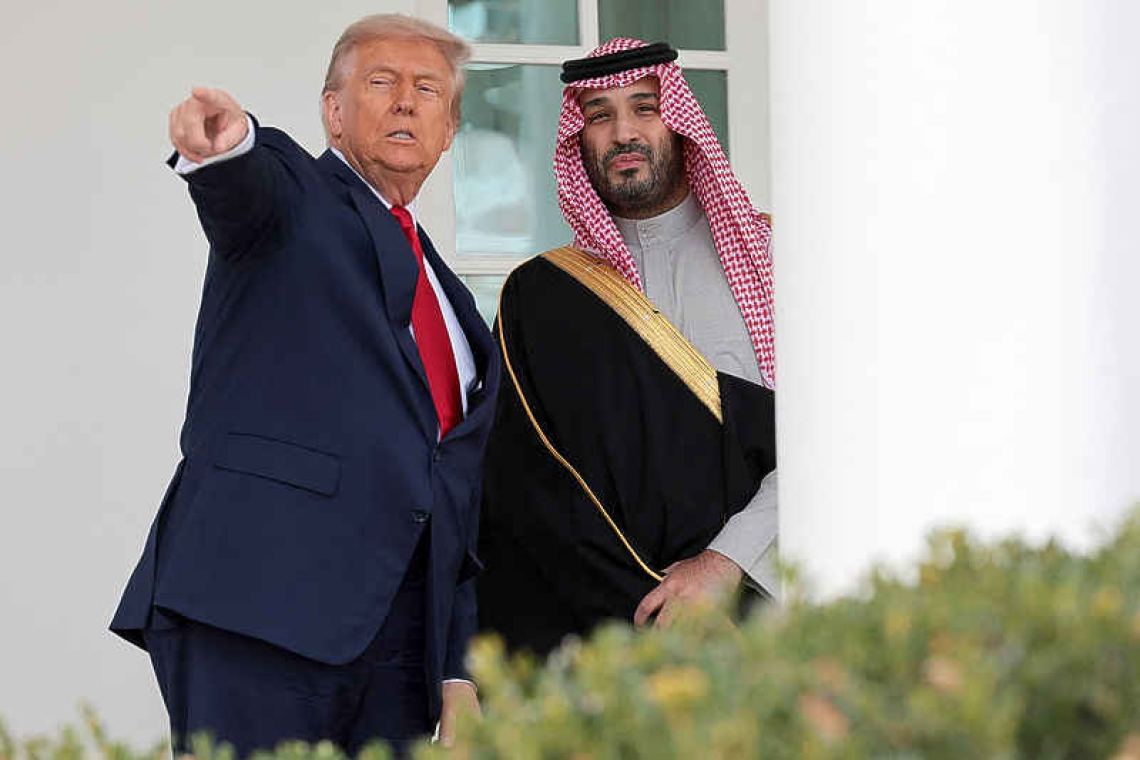WASHINGTON--U.S. President Donald Trump said on Tuesday that Mohammed bin Salman knew nothing about the 2018 killing of journalist Jamal Khashoggi by Saudi agents, offering a fierce defense of the visiting Saudi crown prince that contradicted a U.S. intelligence assessment.
The controversy over the killing of Khashoggi, a Washington Post columnist and U.S.-based critic of the Saudi leadership, flared again in the Oval Office in front of cameras as the kingdom's de facto ruler made his first White House visit in more than seven years, seeking to further rehabilitate his global image tarnished by the incident.
U.S. intelligence agencies concluded that bin Salman approved the capture or killing of Khashoggi at the Saudi consulate in Istanbul. The crown prince denied ordering the operation but acknowledged responsibility as the kingdom's de facto ruler.
"A lot of people didn't like that gentleman that you're talking about, whether you like him or didn't like him," Trump told reporters, with bin Salman sitting beside him. "Things happened, but he knew nothing about it, and we can leave it at that."
Bin Salman said it had been "painful" to hear about Khashoggi's death but that his government "did all the right steps of investigation." "We've improved our system to be sure that nothing happened like that. And it's painful and it's a huge mistake," he told reporters.
Trump, who chided the reporter who asked the Khashoggi question "to embarrass our guest," also praised the crown prince for doing an "incredible" job on human rights, but did not elaborate.
Trump's treatment of bin Salman prompted a rebuke from Khashoggi's widow. "Nothing (can) justify just a horrible crime ... because he's controversial or he's unliked by someone," Hanan Elatr Khashoggi told Reuters in an interview, adding that she wished Trump would meet with her so she could introduce him to the "real Jamal."
Bin Salman has been strongly criticized by human rights groups not only for the Khashoggi killing but for his crackdown on dissent at home. But the crown prince has also unleashed major social reforms that have swept away some austere social codes.
The meeting underscores a key relationship - between the world's biggest economy and the top oil exporter - that Trump has made a high priority in his second term as the international uproar around the killing of Khashoggi has gradually faded.
The warm welcome for bin Salman in Washington marks a high point for U.S.-Saudi ties, which have suffered because of Khashoggi's murder. Trump's predecessor Joe Biden travelled to the kingdom and met with the Saudi prince but he stopped short of hosting him at the White House.
Trump said he received a "positive response" about the prospects for Saudi Arabia normalizing ties with Israel. But the crown prince made clear that while he wanted to join the Abraham Accords, he was sticking to his condition that Israel must provide a path to Palestinian statehood, which it has refused to do.
The White House later announced that Trump had approved future deliveries of F-35 fighter jets and the Saudis had agreed to purchase 300 American tanks.
The two sides also signed a Strategic Defense Agreement, which "fortifies deterrence across the Middle East," the White House said. It provided few details of the agreement, which appeared to fall short of the congressionally ratified NATO-style treaty Saudi Arabia initially sought from Trump.
The sale of the stealth fighter jets to the kingdom, which has requested to buy 48 of the advanced aircraft, would mark the first U.S. sale of the advanced fighter jets to Riyadh, a significant policy shift. The deal could alter the military balance in the Middle East and test Washington's definition of maintaining what the U.S. has termed Israel's "qualitative military edge." Until now, Israel has been the only country in the Middle East to have the F-35.
The two countries also signed a joint declaration on the completion of negotiations on civil nuclear energy cooperation, which the White House said would build the legal foundation for a long-term nuclear energy partnership.
Bin Salman has been seeking a deal to unlock access to U.S. nuclear technology and help Saudi Arabia level up with the UAE and traditional regional foe Iran. But progress on such a nuclear pact has been difficult because the Saudis have resisted a U.S. stipulation that would rule out enriching uranium or reprocessing spent fuel - both potential paths to a bomb.
Trump said earlier that he could see a deal on civilian nuclear power happening, but added, "It's not urgent."







